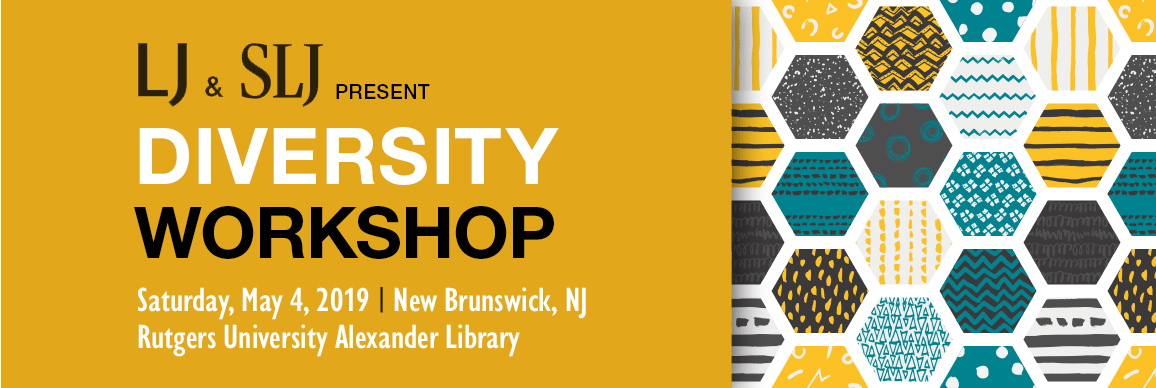Cultural Literacy and Diversity for Librarians

Saturday, May 4th, 2019 | Registration opens at 10:00 AM | Program Ends 5:00 PM
The editors of School Library Journal present a one-day workshop on Cultural Literacy and Diversity for Librarians. This immersive, interactive day of learning will focus on the evaluation of books and media, collection development practices, readers’ advisory, and book marketing and promotion. Attendees will come away with an understanding of key concepts, such as white privilege, implicit bias, and intersectionality. Librarians will learn how to recognize offensive stereotypes, tropes, and microaggressions within media and how to assess for authenticity and appropriation. Participants will get an overview and tips on performing a diversity audit and learn how to craft selection policies and guidelines that set benchmarks for diversity and inclusion.
Instructors will include Mahnaz Dar, School Library Journal reference and professional reading editor; Kiera Parrott, reviews director at Library Journal and School Library Journal, and Cassie Sheets, University of Montana Instructor and Children's Literature Consultant.
Primary audience: school librarians; public youth services librarians; educators
Key skills/competencies addressed:
- Understanding of key diversity and cultural literacy concepts such as white privilege, implicit bias, stereotypes and tropes, microaggressions, cultural appropriation, and intersectionality.
- Ability to recognize common problematic elements in text and art.
- Ability to assess the diversity and inclusiveness of current collection development, RA, and promotional practices.
- Tools, tips, and advice on how to better diversify collections and displays and how to advocate for inclusive books.
Arrive the day before for the one-day workshop, SLJ Leadership Basecamp with the Two Day Access Pass.
Diversity Workshop-Rutgers
10-10:30 am Registration
10:30-1:30 pm Building the Foundation: Critical Concepts and Frameworks
Overview of the Day, Agreements, and Toolkit
A Look at Librarianship & Publishing Statistics, and the State of “Diverse Books”
Overview of industry statistics and a refresher on Dr. Rudine Sims Bishop’s concept of “windows
and mirrors.”
What Does It Mean To Be Culturally Competent?
Participants will learn about the Bennett Model of Cultural Competency and test their skills at
identifying the various stages of competency.
What Are the Dimensions of Diversity?
Participants will learn about and discuss the core, primary, secondary, organizational, and era-
based elements that comprise identity.
What Is Implicit Bias?
Participants will learn about implicit, or unconscious, prejudices and how bias affects their work in
libraries and classrooms.
Understanding and Exploring Privilege
After learning about Peggy McIntosh’s “Unpacking the Invisible Knapsack” framework, participants
will engage in an activity designed to explore and better understand one’s various privileges
and how those privileges impact our ability to empathize and adapt to other perspectives.
What Is Intersectionality?
Participants will examine Dr. Kimberlé Crenshaw’s concept of intersectionality and how an
understanding of this framework allows individuals to evaluate literature, media, and
library services through a more inclusive lens.
1:00-1:45 pm Lunch
1:45-4:45 pm Putting It Into Practice
A Brief History
Identifying Red Flags
A deep dive into specific problematic areas in literature and popular media that librarians,
materials selectors, and anyone engaging in readers’ advisory or book promotion should be
aware of and able to identify.
Book Evaluation Practice
After learning about common stereotypes and tropes in literature and media, participants will, in
small groups, analyze and evaluate at least one picture book, looking for “red flags” for
further discussion.
Application to Everyday Responsibilities
Tips and advice on how to apply culturally competent practices—including an understanding of the
effects of implicit biases and privilege and the application of an intersectional lens—to
collection development (such as performing a diversity audit), displays, readers’ advisory,
and other library services.
Personal Action Plan
Finally, participants will reflect on what they’ve learned and identify three actionable items to
launch or refine within their library or school; personal action plans will be mailed back to
each participant in approximately 30 days.
Sponsor

Partners

ALREADY A SUBSCRIBER? LOG IN
We are currently offering this content for free. Sign up now to activate your personal profile, where you can save articles for future viewing



